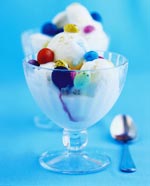The claim: Sugar is addictive
In 2002 a team from Princeton University reported that rats developed what looked like an ‘addiction’ to a 25 percent sugar solution. Over one month the rats gradually ate less of their normal food and more sugary solution every day.
They also showed drug-like ‘withdrawal’ symptoms, including shaking and teeth chattering, when it was denied.
Suddenly, there was apparent scientific support for human sweet cravings and chocoholism. Sugar ‘addiction’ became a dietary buzzword.
But the sugar industry has claimed that similar ‘addictive’ effects can be seen in rats who receive sweet solutions that are sugar and kilojoule free, and no conclusive studies have been done in humans.
According to Browne, taste appreciation varies, but there is evidence of a positive ‘sweet-taste effect’. “Research done on crying newborns has shown that when given a sweet solution, rather than water, babies quickly calm down and stop crying,” she says.
So this sweet-taste effect — instead of addiction could explain the human love for sweet stuff.
The verdict: FALSE
The claim: Diabetics must never eat sugar
“Yes, type 1 and 2 diabetes are conditions involving aberrant sugar metabolism. Dietician and Shape advisory board member Jane Badham,” says however, that the issue of diabetes is much broader than just sugar. As more diabetics are more at risk of dying of heart disease.
Controlling blood sugar levels is as important as controlling lipid levels, hypertension and weight.
Badham’s view is simple: “I’d actually recommend sugar to diabetics as part of a dietician-designed eating plan – in line with the globally accepted dietary recommendations.”
In addition, Badham doesn’t support use of the term ‘diabetic’ for sugar-free products because, ‘there’s no real reason for diabetics to totally exclude sugar’.
Plus, many ‘diabetic’ products pose other health risks because they’re high in fat. As a result, the first draft of proposed new labelling regulations in SA has now disallowed the use of this dubious dietary claim.
Therefore, a moderate intake of sugar has its place in the diabetic diet.
The verdict: FALSE
The claim: Artificial sweeteners cause cancer
Almost every artificial or non-nutritive sweetener on the market has had its 15 minutes of shame. These sugar substitutes are intensely sweet – in many cases hundreds or thousands of times sweeter than sugar itself.
This means only tiny amounts are required and the energy contribution is minimal. But they’ve still been suspected of being maximally dangerous.
For example, Cyclamate was banned in the US in 1970 after a study showed that large doses increased the incidence of bladder cancer in rats. Cyclamate is no longer implicated as a carcinogen and has been approved for use in over 50 countries, including SA – although it’s still banned in the US.
The above sweetener and many others used in SA have been cleared of all health charges.
Badham says thaat she has no problem with sweetners, provided that they’ve been listed as safe with the recognised bodies.
The verdict: FALSE

